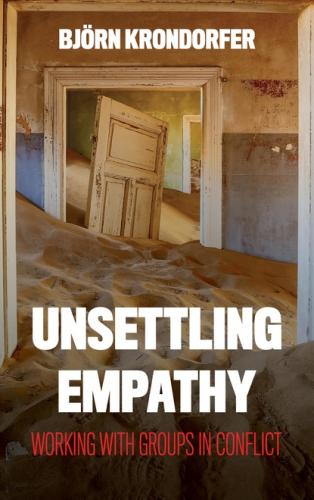12.
Hagiodrama is the creative encounter with stories from the history of Christianity unfolding in group processes; sutradrama is the creative encounter with texts and vignettes from the Buddhist scriptural traditions unfolding in group processes. See Krondorfer, “Werkstattbericht: Bibliodrama und Sutradrama” (2008b).
13.
The association is called The Study Group on Intergenerational Consequences of the Holocaust, formerly PAKH. According to their website, it was “founded in 1995 by Jewish and non-Jewish German members, most of them psychotherapists. It is open to all persons who are interested in a better understanding of conflicts in the context of politically and individually motivated violence.” http://pakh.de/EN/index.html (accessed January 11, 2019). The group’s publications include Liliane Opher-Cohn et al., Das Ende der Sprachlosigkeit (1998), and Beata Hammerich et al., “A Reflection on the Dialogue Process Between Second Generation Descendants of Perpetrators and of Holocaust Survivors in Germany” (2009).
14.
The Olga Lengyel Institute for Holocaust Studies and Human Rights (https://www.toli.us/).
15.
The artist is Karen Baldner; see Krondorfer, “From Pulp to Palimpsest: Witnessing and Re-Imagining through the Arts” (2013b). Since 2004, our work has been exhibited in solo and group shows in numerous venues. See also Baldner’s website, http://karenbaldner.com/the-jewishgerman-dialogue-project.html. Our collaboration is described in more detail in Chapter 10.
16.
The organization is Friendship Across Borders (FAB). Founded in 2003, FAB is, according to its website, “a non-governmental peace-organization, in which Germans, Palestinians and Israelis work together. Our principle activity is to train young adults in mutual understanding, respect and acceptance through their own personal transformation, so that they become ‘Peace-Carriers’ in their societies. In the framework of trilateral dialogues, FAB promotes peace between Palestinians and Israelis and contributes to reconciliation between Germans and Jews.” http://www.fab-friendshipacrossborders.net/en/ (accessed January 11, 2019).
17.
Located at the campus of Northern Arizona University, the Martin-Springer Institute was founded and endowed by Ralph and Doris Martin in 2000. Doris Martin (née Szpringer) was born in Bedzin, Poland, and survived the Holocaust. The institute attends to the experiences of the Holocaust in order to relate them to today’s concerns, crises, and conflicts. With educational and public programs that promote the values of moral courage, empathy, reconciliation, and justice, it fosters dialogue on local, national, and international levels. See http://nau.edu/martin-springer and Facebook.com/MSIatNAU.
18.
The workshops and interactive seminars I offer can last from a few hours to several days, and in some cases, weeks. The ideal group size for such intergroup, intercultural, and sometimes intergenerational encounters is twelve to eighteen participants, but I have worked with fewer people and with groups of forty and more participants.
19.
The rule of not being able to identify individuals applies to the readers of this book. It does not apply in the same way to people who participated in particular programs since they might remember specific scenarios and people I am describing in these chapters.
20.
Individual participants can, of course, choose to speak publicly or to the media as long as this does not happen during the sessions themselves. See, for example, the video link to interviews with Palestinian and Israeli participants of the Eighth International Seminar “Touching Borders,” a workshop I conducted in 2015: www.fab-friendshipacrossborders.net/en/ (accessed June 4, 2019).
21.
Since I am engaging various fields of inquiry, which are themselves dependent on transdisciplinary scholarship (such as trauma studies, memory studies, reconciliation studies, peace and conflict resolution studies, and studies in empathy), I have consulted a wide range of disciplines, including history, sociology, social psychology, philosophy, international relations, literary studies, art history, religious studies, psychoanalysis, political science, anthropology, humanities, and gender studies.
22.
My footnotes will provide the reader with the necessary sources and references; they also indicate discrepancies in the usage of particular terms and concepts.
23.
When I am quoting from personal correspondence shared with me—often via email—I have occasionally made editorial corrections concerning grammar, spelling, syntax, and length.
24.
The 2018 Third Global Forum Against the Crimes of Genocide was organized by the Ministry of Foreign Affairs of the Republic of Armenia. Invited participants included a select group of international scholars, representatives of the UN and European Human Rights commissions, directors of memorial museums, and NGO practitioners.
Конец ознакомительного фрагмента.
Текст предоставлен ООО «ЛитРес».
Прочитайте эту книгу целиком, купив полную легальную версию на ЛитРес.
Безопасно оплатить книгу можно банковской картой Visa, MasterCard, Maestro, со счета мобильного телефона, с платежного терминала, в салоне МТС или Связной, через PayPal, WebMoney, Яндекс.Деньги, QIWI Кошелек, бонусными картами или другим удобным Вам способом.
